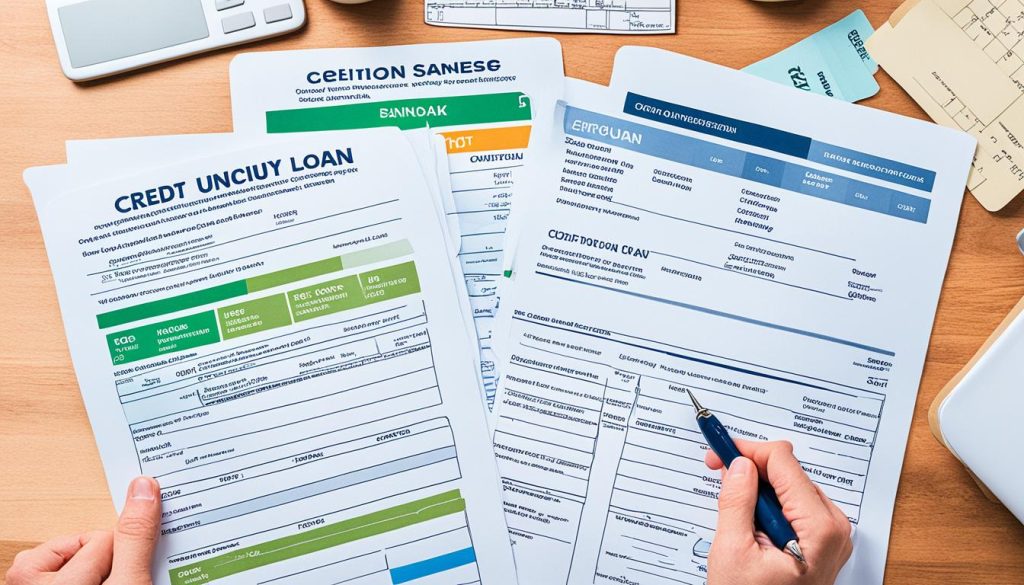Welcome to our guide on American Express home equity loans! If you’re a homeowner looking for financial options to leverage your assets and make smart decisions, American Express offers a range of home equity loan options that can help you achieve your goals.
By tapping into the value of your home, you can access funds for various purposes, such as home improvements, debt consolidation, or educational expenses. However, it’s crucial to have a thorough understanding of the American Express home equity loan options before making any decisions.
Throughout this guide, we will explore the pros and cons of American Express home equity loans, the benefits and risks associated with their home equity lines of credit (HELOCs), and alternatives you can consider. This information will enable you to make an informed choice and determine if an American Express home equity loan is the right fit for your financial needs.
Let’s dive in and uncover the possibilities that American Express home equity financing can offer you. And remember, our goal is to provide you with the necessary insights to make informed financial decisions that align with your goals and aspirations.
Key Takeaways:
- American Express offers various home equity loan options to help homeowners leverage their assets.
- Understanding the pros and cons of American Express home equity loans is essential in making informed decisions.
- American Express home equity lines of credit (HELOCs) provide flexibility and potential tax advantages.
- However, there are risks associated with American Express HELOCs, such as variable interest rates and the possibility of accumulating debt quickly.
- It’s crucial to assess your financial situation and consult with a professional before choosing an American Express home equity loan.
Pros and Cons of American Express Home Equity Loans
American Express home equity loans offer homeowners a range of advantages and disadvantages to consider. It is crucial to evaluate these pros and cons carefully to make an informed decision about whether an American Express home equity loan is the right choice for you.
Pros of American Express Home Equity Loans
There are several advantages to choosing an American Express home equity loan:
- **Lower interest rates**: American Express home equity loans often come with lower interest rates compared to credit cards and personal loans. This can result in significant savings over the life of the loan.
- **Flexible funds**: With an American Express home equity loan, you have the flexibility to use the funds for a variety of purposes, such as home renovations, debt consolidation, or education expenses.
- **Tax-deductible interest**: Depending on your circumstances, the interest paid on your American Express home equity loan may be tax-deductible. Consult with a tax professional for more information.
- **Credit score potential**: Making regular, timely payments on your American Express home equity loan can help boost your credit score over time.
Cons of American Express Home Equity Loans
While there are many benefits to American Express home equity loans, it’s essential to consider the potential drawbacks:
- **Variable interest rates**: American Express home equity loans may have variable interest rates, meaning that your monthly payments could fluctuate over time.
- **Risk of collateral loss**: With a home equity loan, your home serves as collateral. If you default on the loan, there is a risk of losing your home.
- **Smaller equity cushion**: Taking out a home equity loan reduces the equity you have in your home, which may limit future borrowing capabilities.
- **Debt accumulation**: Without proper management, there is a potential to accumulate debt quickly by tapping into your home’s equity.
It is important to weigh these pros and cons carefully and consider your own financial situation before deciding to pursue an American Express home equity loan.
| Pros | Cons |
|---|---|
| Lower interest rates compared to credit cards and personal loans | Variable interest rates |
| Flexible use of funds | Risk of losing home as collateral |
| Possible tax-deductible interest | Smaller equity cushion |
| Potential to boost credit scores | Potential to accumulate debt quickly if not managed properly |
Benefits of American Express Home Equity Lines of Credit (HELOCs)
When it comes to leveraging the value of your home, American Express Home Equity Lines of Credit (HELOCs) offer a range of benefits that can help you achieve your financial goals. Here are some key advantages of choosing an American Express HELOC:
1. Lower Interest Rates
Compared to other forms of credit, such as credit cards or personal loans, American Express HELOCs typically come with lower interest rates. This can save you money in the long run and make borrowing more affordable.
2. Flexibility in Accessing Funds
With an American Express HELOC, you have the flexibility to access funds as needed. Whether you’re renovating your home, paying for education expenses, or handling unexpected medical bills, you can tap into your home’s equity when the need arises.
3. Potential Tax Deductions
Interest payments on a HELOC used for home renovations may be tax-deductible, allowing you to further maximize your financial benefits. Make sure to consult with a tax professional to understand the specific deductions available to you.

4. Boost to Credit Scores
Consistently making timely payments on your American Express HELOC can help improve your credit score over time. This can open up opportunities for better interest rates and loan terms in the future.
By offering lower interest rates, flexibility in accessing funds, potential tax deductions, and the ability to boost credit scores, American Express HELOCs provide homeowners with a range of financial advantages. Borrow against your home’s equity, keep your monthly payments manageable, and avoid unnecessary debt through the benefits of an American Express HELOC.
Risks Associated with American Express Home Equity Lines of Credit (HELOCs)
While American Express HELOCs offer various advantages, it is essential to understand and consider the risks that come with this type of home equity financing. By assessing these risks, borrowers can make informed decisions regarding American Express HELOCs and manage their finances responsibly.
Variable Interest Rates
One of the risks associated with American Express HELOCs is the variability of interest rates. Unlike traditional fixed-rate loans, HELOCs often come with adjustable interest rates that can fluctuate over time. This means that borrowers may experience changes in their monthly payments, making it harder to budget and plan for their financial obligations.
Collateralization
American Express HELOCs use the borrower’s home as collateral, which poses a risk to homeowners. If the borrower fails to repay the loan, American Express has the right to foreclose on the property. This risk is particularly significant if the borrower’s financial situation changes or if there is a decrease in the home’s value.
Home Equity Fluctuation
Another risk to consider is the potential decrease in home equity if property prices decline. When property values drop, homeowners may find themselves owing more on their American Express HELOCs than their homes are worth. This situation can limit future borrowing options and may result in financial strain.
Debt Accumulation
American Express HELOCs come with a draw period, during which borrowers can access funds as needed. This flexibility can be a potential risk, as it may lead to the temptation to accumulate debt quickly. If borrowers do not exercise discipline and spend within their means, they may find themselves burdened with excessive debt once the repayment period begins.
“It is crucial for borrowers to evaluate their financial situation and have a clear repayment plan in place before opting for an American Express HELOC.”
Despite these risks, American Express HELOCs can be a valuable financial tool for homeowners. By understanding and managing the potential risks involved, borrowers can make informed decisions that align with their financial goals and avoid unnecessary pitfalls.
Risks Analysis
| Risks | Description |
|---|---|
| Variable Interest Rates | Fluctuating interest rates can affect monthly payments and financial planning. |
| Collateralization | The home serves as collateral, so failure to repay the loan can lead to foreclosure. |
| Home Equity Fluctuation | If property values drop, borrowers may owe more on the HELOC than their homes are worth. |
| Debt Accumulation | The temptation to accumulate debt quickly during the draw period may lead to financial strain. |

Is an American Express Home Equity Loan the Right Choice for You?
When considering your financial options, it’s important to assess whether an American Express home equity loan aligns with your specific needs and circumstances. Several factors come into play when deciding if this type of loan is the right fit for you.
1. Amount of equity in your home: Before choosing an American Express home equity loan, it’s crucial to evaluate the amount of equity you have in your home. The equity is the difference between the current market value of your home and the outstanding balance on your mortgage. The higher the equity, the more funds you may be able to borrow through a home equity loan.
2. Need for regular access to funds: If you have ongoing financial commitments or anticipate the need for regular access to funds over a period of time, an American Express home equity loan could be a suitable option. With a home equity loan, you receive a lump sum upfront and can utilize the funds as needed for various purposes.
3. Ability to manage debt responsibly: Taking on a home equity loan requires responsible financial management. You need to consider your ability to comfortably repay the loan, including interest and any associated fees. It’s crucial to create a budget and ensure that adding another monthly payment won’t strain your financial situation or hinder your ability to meet other financial obligations.
4. Willingness to accept risks: Like any type of loan, an American Express home equity loan comes with risks. It’s crucial to understand that your home serves as collateral for the loan, which means that failure to meet repayment obligations could result in the loss of your home. Additionally, the fluctuation of interest rates and potential changes in the housing market can impact loan terms and repayment amounts. Being informed about these risks is essential in making an educated decision.
To make an informed choice, it’s recommended that you carefully evaluate your financial goals and consult with a financial advisor. They can provide personalized guidance based on your specific circumstances and help you determine whether an American Express home equity loan is the right choice for you.
Remember, making the right decision about your home equity loan requires careful consideration and planning. Take the time to assess your financial situation and align your goals with the loan terms and risks associated with an American Express home equity loan.

Alternatives to American Express Home Equity Loans
While American Express home equity loans can be a suitable option for many homeowners, they may not meet everyone’s financial needs. Thankfully, there are several alternatives to consider when exploring borrowing options. By assessing individual requirements and priorities, individuals can find the best solution that aligns with their unique circumstances.
Home Equity Loans with a Lump Sum of Cash
One alternative to American Express home equity loans is opting for a traditional home equity loan that provides a lump sum of cash upfront. With this option, borrowers receive a fixed amount of money and repay it in regular installments over a predetermined period. This can be beneficial for those who have a specific financial goal in mind, such as a home renovation or debt consolidation.
Cash-Out Refinancing
Another alternative is cash-out refinancing, which involves replacing the existing mortgage with a new one that has a higher loan balance. The difference between the new loan amount and the current mortgage balance is received as cash. This option can be advantageous for homeowners who have built significant equity in their homes and wish to tap into it for various financial purposes.
Other Borrowing or Financing Options
Depending on individual requirements and goals, there are other forms of borrowing or financing to consider. These may include personal loans, credit cards, or even other types of mortgage products. Exploring these alternatives can help individuals evaluate the interest rates, repayment terms, and eligibility requirements to make an informed decision.
It is crucial to thoroughly research and compare the terms, conditions, and rates associated with each alternative. Additionally, consulting with a financial advisor can provide valuable guidance in selecting the most suitable option.

Comparison of Home Equity Loan Alternatives
| Alternative Option | Amount of Funds | Repayment Terms | Interest Rates | Collateral |
|---|---|---|---|---|
| Home Equity Loans | Fixed lump sum | Regular installments | Fixed or variable | Home serves as collateral |
| Cash-Out Refinancing | Determined by equity | New mortgage terms | Fixed or variable | Home serves as collateral |
| Personal Loans | Varying amounts | Fixed repayment period | Fixed interest rates | May not require collateral |
| Credit Cards | Based on credit limit | Flexible monthly payments | Variable interest rates | No collateral required |
Keep in mind that each alternative has its advantages and disadvantages, so it’s crucial to evaluate the benefits, risks, and financial implications before making a decision.
Conclusion
In conclusion, American Express home equity loans present homeowners with an opportunity to leverage their assets and make informed financial decisions. With lower interest rates compared to credit cards and personal loans, the flexibility to use funds for various purposes, and the potential to boost credit scores, these loans offer numerous benefits.
However, it is crucial for individuals to carefully consider the pros and cons before choosing an American Express home equity loan. Assessing their individual financial goals and understanding the risks involved, such as variable interest rates and the possibility of the home being used as collateral, is essential.
Consulting with a financial advisor can provide valuable guidance throughout the decision-making process and ensure that homeowners make informed choices regarding their home equity financing. Ultimately, by weighing the advantages, evaluating personal circumstances, and seeking professional advice, individuals can determine if an American Express home equity loan is the right fit for them.
FAQ
What are the advantages of American Express home equity loans?
What are the disadvantages of American Express home equity loans?
What are the benefits of American Express Home Equity Lines of Credit (HELOCs)?
What are the risks associated with American Express Home Equity Lines of Credit (HELOCs)?
How do I know if an American Express home equity loan is the right choice for me?
What are the alternatives to American Express home equity loans?
Source Links
- https://www.theretirementgroup.com/featured-article/5448090/decoding-the-home-equity-line-of-credit-heloc-weighing-the-pros-and-cons-for-american-express-employees
- https://www.bankrate.com/home-equity/pros-cons-of-home-equity-lines/
- https://www.theretirementgroup.com/featured-article/5448113/home-equity-loans-5-key-ways-to-leverage-them-in-retirement-from-american-express




No comments! Be the first commenter?